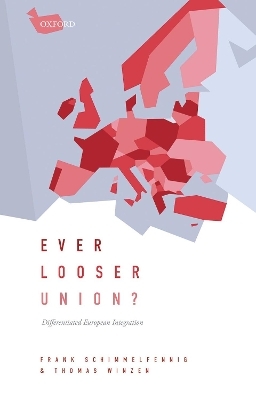
Ever Looser Union?
Oxford University Press (Verlag)
978-0-19-885433-3 (ISBN)
Differentiated integration has become a durable feature of the European Union and is a major alternative for its future development and reform. This book provides a comprehensive conceptual, theoretical, and empirical analysis of differentiation in European integration. It explains differentiation in EU treaties and legislation in general and offers specific accounts of differentiation in the recent enlargements of the EU, the Eurozone crisis, the Brexit negotiations, and the integration of non-member states. Ever Looser Union? introduces differentiated integration as a legal instrument that European governments use regularly to overcome integration deadlock in EU treaty negotiations and legislation. Differentiated integration follows two main logics. Instrumental differentiation adjusts integration to the heterogeneity of economic preferences and capacities, particularly in the context of enlargement. By contrast, constitutional differentiation accommodates concerns about national self-determination. Whereas instrumental differentiation mainly affects poorer (new) member states, constitutional differentiation offers wealthier and nationally oriented member states opt-outs from the integration of core state powers. The book shows that differentiated integration has facilitated the integration of new policies, new members, and even non-members. It has been mainly 'multi-speed' and inclusive. Most differentiations end after a few years and do not discriminate against member states permanently. Yet differentiation is less suitable for reforming established policies, managing disintegration and fostering solidarity, and the path-dependency of core state power integration may lead to permanent divides in the Union.
Frank Schimmelfennig is Professor of European Politics at ETH Zurich, Switzerland. He is a member of the Center for Comparative and International Studies of ETH and the University of Zurich. His research focuses on European integration and, specifically, integration theory, enlargement, differentiated integration, EU democracy promotion, and democratization. Thomas Winzen is a Lecturer in Government at the University of Essex, United Kingdom. His research focuses on the design and legitimate governance of the European Union and other international institutions with a particular interest in differentiated integration, parliamentarization, and emerging structures of global internet governance.
1: Introduction
Part 1. Mapping and Explaining Differentiated Integration
2: Concepts: Differentiated Integration and its Modes
3: Theory: The Choice for Differentiated Integration
4: Mapping Differentiated Integration
5: Explaining Differentiation in EU Treaties
6: Explaining Differentiation in EU Legislation
Part 2. Extensions
7: Normalization: New Member States and Differentiated Integration
8: Path Dependence: Differentiated Integration in the Euro Crisis
9: Differentiated Disintegration: Brexit
10: Regional Differentiation: Beyond the EU Member States
11: Conclusions; Is Differentiation Good for Europe?
| Erscheinungsdatum | 15.04.2020 |
|---|---|
| Verlagsort | Oxford |
| Sprache | englisch |
| Maße | 160 x 240 mm |
| Gewicht | 514 g |
| Themenwelt | Sozialwissenschaften ► Politik / Verwaltung ► Europäische / Internationale Politik |
| Sozialwissenschaften ► Politik / Verwaltung ► Politische Theorie | |
| ISBN-10 | 0-19-885433-1 / 0198854331 |
| ISBN-13 | 978-0-19-885433-3 / 9780198854333 |
| Zustand | Neuware |
| Haben Sie eine Frage zum Produkt? |
aus dem Bereich


